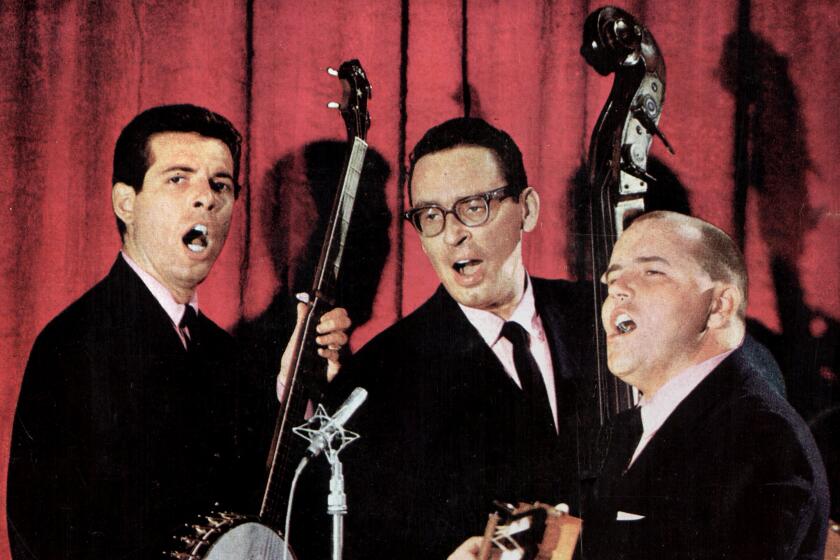Jean Ritchie dies at 92; singer was influential in Appalachian folk music
When Jean Ritchie was growing up in rural Kentucky, warm evenings had a character all their own.
After a day’s work in the cornfield, the kids — Jean was the youngest of 14 — would gather on the family porch. Her mom, Abigail, would sway back and forth in the swing, and her dad, Balis, would start playing his mountain dulcimer, and, after awhile, the whole family would sing. As the evening deepened, they and their neighbors would, as they said, sing the moon up.
Jean Ritchie kept on singing. She sang songs about courting and kings — ballads from the 1700s, when her forebears came from Scotland and Ireland. She sang well-loved lullabies and nearly forgotten children’s rhymes. She sang her own protest songs about coal miners dying of black lung disease and mining companies lopping off mountaintops.
The girl from Viper, a hamlet in a hollow with just 15 or 20 houses, became one of Appalachia’s most compelling voices and a powerful influence in American folk music, releasing more than 30 albums and performing globally.
Ritchie, who is credited with saving songs that would have otherwise died and turning the once-obscure dulcimer into a folk music staple, died Monday at her home in Berea, Ky. She was 92.
“No one was more important to the survival, appreciation, and revival of traditional Appalachian folk music in the 20th and 21st centuries,” said the American Folklore Center of the Library of Congress, spreading word of her death on Facebook.
In an interview with The Times, Dean Osborne, director of the Kentucky School of Bluegrass and Traditional Music, likened Ritchie’s influence on Appalachian music to that of Bill Haley and Chuck Berry on rock ‘n’ roll.
“She was one of the first to have an international audience,” said Osborne, whose music program is part of Hazard Community and Technical College. “And once you heard her voice, you’d never forget it. It was pure and clear, a high-lonesome sound totally unadulterated and haunting.”
Ritchie was more wryly offhand about her talents.
“I was asked to attend some parties and bring my dulcimer,” she told the Associated Press in 2008. “That’s how my so-called career got started.”
Of course, there was a little more to it.
A Phi Beta Kappa graduate of the University of Kentucky, Ritchie tried teaching in her home state before moving to New York City for a job at the Lower East Side’s Henry Street Settlement.
Using her music to calm unruly children, she enchanted a visitor who asked her to play at an NYU alumni group’s afternoon tea. In a short while, Ritchie was performing all over town.
In Greenwich Village coffeehouses, Ritchie shared the stage with Pete Seeger and Bob Dylan. Playing at a handicraft shop in Rockefeller Center, she impressed maestro and music executive Mitch Miller, who recorded her children’s songs. One afternoon in the late 1940s, she stunned folklorist Alan Lomax when she knocked on his office door.
“This young lady came in — this beautiful, golden-haired woman from the mountains with a gorgeous voice,” he once recounted to the Louisville Courier-Journal. “She said her friends had told her she should sing for me, and she wondered if she could do so. She hadn’t gone very far when suddenly the tears came to my eyes and I was crying at the beauty.”
Her songs include “Black Waters,” “Blue Diamond Mines” and “The L&N Don’t Stop Here Any More.” She once told an interviewer that her rendition of “Amazing Grace” at the Newport Folk Festival soothed a crowd angry with Arlo Guthrie for refusing to reprise “Alice’s Restaurant.”
“It’s truly a powerful song,” she said.
Born Dec. 8, 1922, Ritchie grew up in a family locally renowned for its music. Five years before Jean was born, the Ritchies hosted Cecil Sharp, a British folk music expert who was tracing the path that old songs had taken in America.
In her 1955 book, “Singing Family of the Cumberlands,” Ritchie wrote nostalgically about picking out “Go Tell Aunt Rhody” on her father’s dulcimer when she was 4 or 5. She wrote about the old porch swing, and “the way it creaked in time to the music — fast little squawks with the quick tunes, melancholy moans with the slow, sad ones. What a safe, warm world it was for me then. ....”
She married photographer George Pickow in 1950, and together the two built dulcimers at a small shop in Brooklyn. They traveled to England when she won a Fulbright fellowship in 1952, and around the world during her performing career.
Ritchie, Pickow and their two sons spent most of their time in Port Washington, N.Y., but made a point of returning to Kentucky at least several months every year. He died in 2010.
Ritchie is survived by their sons, Jon and Peter, and her brother Wilmer. Her other siblings — Mae, Ollie, Mallie, Una, Raymond, Kitty, Truman, Patty, Edna, Jewel, Opal and Pauline — predeceased her.
Ritchie, who had a stroke in 2009, lived full time in Kentucky during her later years and performed on occasion well into her 80s.
She saw certain advantages in aging.
“People retire at the age of 65, but I don’t think folk singers do,” she told the New York Times in 1998. “Your voice cracks a little, and people say, ‘Oh, she’s very authentic.’ ”
Twitter: @schawkins
More to Read
Start your day right
Sign up for Essential California for the L.A. Times biggest news, features and recommendations in your inbox six days a week.
You may occasionally receive promotional content from the Los Angeles Times.







